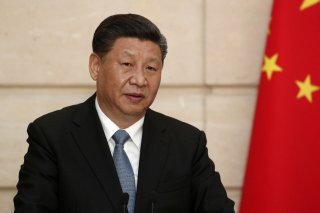Xi Jinping Slams U.S.-Led Alliances and Sanctions at ‘Asian Davos’
Although Xi did not specifically reference Russia, he argued in general terms that economic tactics like “de-coupling, supply disruption, and maximum pressure” were bound to fail.
Chinese president Xi Jinping implicitly criticized the United States’ approach to economic sanctions against Russia on Thursday, claiming at a high-profile international conference that he opposed “the wanton use of unilateral sanctions and long-arm jurisdiction.”
Xi made his remarks at the Boao Forum for Asia, a political and economic conference hosted in southern China that typically brings leaders for multi-day discussions from across Asia. The forum is modeled on the World Economic Forum, held annually in Davos, Switzerland, leading some to nickname it the “Asian Davos.”
Although the Chinese leader did not specifically reference Russia—the target of a growing international sanctions regime since its invasion of Ukraine began on February 24—he argued in general terms that economic tactics like “de-coupling, supply disruption, and maximum pressure” were bound to fail and would cause economic damage around the world. He promised that China would push for a resolution to the ongoing war in its “own way” and in respect for the principles of the United Nations charter.
Xi claimed in his speech that the Chinese government was committed to “respecting the sovereignty and territorial integrity of all countries” and the principle of non-interference in other countries’ internal affairs. While China has repeatedly reaffirmed its commitment to the territorial integrity of Ukraine, it has also declined to condemn the Russian invasion and refused to participate in the sanctions campaign against the Kremlin. In the past, China has used the non-interference principle to criticize other countries’ complaints about Chinese human rights practices in Tibet, Xinjiang, Hong Kong, and Taiwan, which China regards as a rebellious province and therefore as an internal matter.
Xi also criticized the creation of what he described as “small circles” created to “stir conflict and confrontation along ideological lines,” seemingly a reference to NATO or U.S.-led security blocs in the Indo-Pacific region, including the new AUKUS alliance and the Quad, which is composed of the United States, Australia, Japan, and India.
The Chinese leader concluded his remarks by arguing that the world’s major nations should build a “balanced, effective, and sustainable security architecture” that takes the interests of all nations into account. He compared this approach to the crew of a ship working together, arguing that “throwing anyone overboard is … not acceptable.”
Xi’s remarks came as China grapples with a resurgence of COVID-19 cases that has led Beijing to order sweeping lockdown measures in Shanghai, its largest city. He claimed that China had made “strenuous efforts” to ensure the safety of its citizens, urging the international community to take further steps to contain the virus.
Trevor Filseth is a current and foreign affairs writer for the National Interest.
Image: Reuters.

